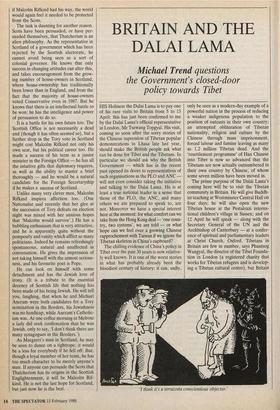BRITAIN AND THE DALAI LAMA
Michael Trend questions
the Government's closed-door policy towards Tibet
HIS Holiness the Dalai Lama is to pay one of his rare visits to Britain from 5 to 13 April: this has just been confirmed to me by the Dalai Lama's official representative in London, Mr Tsewang Topgyal. His visit, coming so soon after the sorry stories of the Chinese supression of Tibetan popular demonstrations in Lhasa late last year, should make the British people ask what can be done for Tibet and the Tibetans. In particular we should ask why the British Government — which has in the recent past opened its doors to representatives of such organisations as the PLO and ANC will not even consider taking the initiative and talking to the Dalai Lama. He is at least a true national leader in a sense that those of the PLO, the ANC, and many others we are prepared to speak to, are not. Moreover we have a special interest here at the moment: for what comfort can we take from the Hong Kong deal — 'one coun- try, two systems', we are told — or what hope can we feel over a growing Chinese rapprochement with Taiwan if we ignore the Tibetan skeleton in China's cupboard?
The chilling evidence of China's policy in Tibet over the past 30 years is now relative- ly well known. It is one of the worst stories in what has probably already been the bloodiest century of history: it can, sadly, only be seen as a modern-day example of a powerful nation in the process of reducing a weaker indigenous population to the position of outcasts in their own country; an attempted obliteration of Tibetan nationality, religion and culture by the Chinese through mass imprisonment, forced labour and famine leaving as many as 1.2 million Tibetan dead. And the `resettlement programme' of Han Chinese into Tibet is now so advanced that the Tibetans are now actually outnumbered in their own country by Chinese, of whom some seven million have been moved in.
The prime purpose of the Dalai Lama's coming here will be to visit the Tibetan community in Britain. He will give Buddh- ist teaching at Westminster Central Hall on four days; he will also open the new Tibetan house at the Pestalozzi interna- tional children's village in Sussex; and on 12 April he will speak — along with the Secretary General of the UN and the Archbishop of Canterbury — at a confer- ence of spiritual and parliamentary leaders at Christ Church, Oxford. Tibetans in Britain are few in number, says Phuntsog Wangyal, the director of the Tibet Founda- tion in London (a registered charity that works for Tibetan refugees and is develop- ing a Tibetan cultural centre), but Britain 'I think it's a terracotta conscientious objector.' has a very strong link with Tibet. It is after all, he says, the only Western nation that has ever had any part to play in the history of his country; and many other nations still ask what the British Government's policy on Tibet is when they come to consider the matter for themselves. (Details of the Dalai Lama's programme can be had from the Office of Tibet, Linburn House, 342 Kilburn High Road, London NW6. Tele- phone, 01-328 8422. The Tibetan Founda- tion can be contacted at 43 New Oxford Street, London WC1. Telephone, 01-379 0634.) The Dalai Lama is, of course, a man utterly committed to a non-violent path in the world. He is also a realist. His own position on the way forward for Tibet was best seen in his statement on Capitol Hill last September: 'We wish to approach [negotiations on the future status of Tibet and the relationship between the Tibetan and Chinese peoples] in a reasonable and realistic way, in a spirit of frankness and conciliation and with a view to finding a solution that is in the long term interest of all: the Tibetans, the Chinese, and all other peoples concerned.' There can be no doubting the Dalai Lama's sincerity in this policy; nor his enormous influence among the more than 100,000 refugees outside Tibet, as well as all his fellow Tibetans inside Tibet. He alone keeps the more militant elements among all Tibetans from tending towards a policy of violence.
But the Dalai Lama's powers of persua- sion have not yet touched the British Government. While both the Americans — at the highest level — and the West Germans have made quite clear that they view the present position of Tibet as fundamentally unacceptable, the British government's position, the Foreign Office tells me, is to be found in this so-carefully- worded formula: 'Successive British gov- ernments have consistently regarded Tibet as autonomous while recognising the spe- cial position of the Chinese authorities there.' This, in brief, is a copy of the Chinese public position. On the Dalai Lama's forthcoming visit the Foreign Office says that there will be no contact between the Government and the Dalai Lama; there is no reason to think that this visit will be any different from previous times when the Dalai Lama came as a religious leader on a private visit, they say. In short the door remains closed.
But why? The British Government has built up quite a record recently of such a `closed-door' policy. At the time of the troubles in Lhasa last year one of the Dalai Lama's ministers, Kalon Tashi Wangdi, came to London bearing a letter from the Dalai Lama to various heads of state asking them to consider exercising their good offices on behalf of Tibetans. Neither 10 Downing Street nor the Foreign Office would even accept the letter. It was even- tually sent to the Prime Minister through a third party and received a very bland reply — to the British third party that is, not to the Dalai Lama. One is free to ask if the British Government need really be so terrified of the Chinese that it cannot even receive a letter from a pacifist. The Government, of course, is worried about Chinese sensitivities, which are par- ticularly acute on the matter on Tibet; but the fact that the Chinese are so sensitive is in itself not a hopeless sign. It is a measure of how bothered they are about the situa- tion in Tibet. They may once have hoped that they could force their form of com- munism onto the Tibetans. The truth is that this has failed. Photographs and re- ports from Lhasa show that the people who were rising up against the Chinese author- ities late last year were in the main young.
Most of these will never have known anything other than Chinese rule of their country. If these younger people have so little love of the Chinese 'motherland' then the whole policy of their 'liberation' is in tatters. Indeed, the Chinese have, ironical- ly, created a specific sense of 'nationalism' in its modern form among the Tibetans which — in a 'country' previously centred on a much wider Buddhist world-view never really existed before.
The question now for the Chinese is not can they control Tibet (we know the answer to that), but how can they control Tibet — and at what cost? There is a powerful argument that says that treating the Tibetans better — giving them the economic and educational opportunities they need and have for years been dep- rived of — can only in the end be in the best interests of both the Chinese as well as the Tibetans. In this, foreign governments — like ours — can surely add their voices, without endangering their own national interests, without stepping outside the bounds of realpolitik, especially as the lead that the Dalai Lama gives is so very reasonable. He is asking for 'good offices', not Stinger missiles; he is not interested in the politics of recrimination, but wants to help the Chinese find a more acceptable and open solution to the situation in Tibet. Foreign governments can show the Chinese that they too can help in this process by pledging international support for policies which are in everyone's best interests.
Some hearts, however, are stouter than those of Whitehall: Baroness Elles, for example, who has invited the Dalai Lama to visit Strasburg to talk to MEPs; and in Britain the new all-party Parliamentarians for Tibet group led by Lord Ennals, Lord Avebury and Sir Bernard Braine, the Father of the House. The British Govern- ment should not turn its face away from such people. After all a government that tells the world at large that it believes that violence is not the way to achieve political solutions should be among the first to support a leader whose consistent policy has been to eschew violence. Tibet can be seen as more or less a test case for the Government's position. The forthcoming visit of the Dalai Lama gives it an oppor- tunity.



























































 Previous page
Previous page